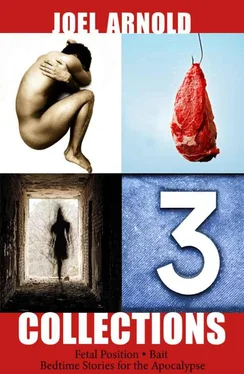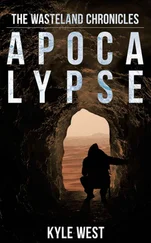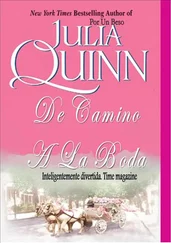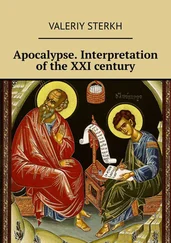He is greeted that evening with Angie’s harsh stare.
“What?” he says.
She waves a bank statement in front of his face. “What the hell is this?”
His stomach turns inside out. Where did she get that? It was supposed to be mailed to his work address. Not here. How the hell—
He tries to bide for more time.
“What are you talking about?”
“You know damn well what I’m talking about.” She reads off two large withdrawals that total thirty-five hundred dollars.
“Investments,” he blurts. “I’m investing in the stock market. I wanted it to be a surprise.”
“Bullshit.”
“Honey, I—”
As she crumples the statement in her hand and throws it at him, hitting him squarely on the jaw, she says, “Pack your crap and get the hell out of here. You’re through.”
“But I—”
His words are lost in the room’s chilled air as she slams the door shut behind her, locking herself in their bedroom.
A month later, Carter’s tape is almost fully depreciated, the face of the victim lost in a blizzard of static. He rents an apartment now, and has no spare cash with which to feed his habit. He writes this on a white half-sheet of college-ruled paper, adding that he can have the money in one short month if he can please just have a new tape. He folds the paper and places it in the empty tape box, mentally keeping his fingers crossed.
When he goes to retrieve the box, it is empty save for another piece of paper. He unfolds it and reads.
We are not in the business of loans, but there is always the option of trade.
The option of trade. What exactly does that mean? He says the words over and over in his mind.
Option of trade.
His hands shake. His unshaven chin works back and forth as if his jaw is trying to free itself from his skull. He pulls a pen from his pocket and scrawls on the paper one word.
Trade.
Brittany’s soccer team has made it into the playoffs. Carter watches them win from the shadows of a giant silver maple tree. He cries uncontrollably when she scores a goal. He wants so badly to run to her, pick her up and carry her away.
Instead, he wipes at his eyes with the back of his shirtsleeve and leaves. He drives to a nearby pawnshop. Uses his wedding ring and a wrinkled hundred-dollar bill as payment for a used video camera.
That night he rents a motel room and sets the camera up on the dresser, aiming it at the motel room bed. He places a shirt over it so that only the lens pokes through. When the call girl knocks, he presses the record button and answers the door.
“Come in,” he says.
“I’m Cherry.”
“Nice to meet you.”
“Likewise.”
INT. MOTEL ROOM — DAY
A call girl named CHERRY comes into view, placing her purse on the bed. She wears too much rouge and eye shadow, and speaks to someone who is off-camera.
“Mind if I use the bathroom?”
She disappears from view, and the camera is lifted from its place on the dresser. It focuses on the bathroom door. The glint of a freshly sharpened hatchet is reflected in the brass doorknob. Cherry opens the door. She is naked and screams as the hatchet hacks its way easily through her make-up.
As she falls to the ground, the camera zooms in on her face, the camera momentarily losing focus, but sharpens on her tongue as it stops in mid-swipe across her bloodied lips. The voice of the cameraman is heard in a distorted, breathless growl as his own lips press into the microphone.
“ Cut.”
Fade out.
Whenever William Farini became aware of himself, when he took note of his existence, it was always here. High above the strewn sawdust, the canvas of the ceiling close enough to smell, the silhouettes of crows perched outside, as if waiting for his cries of pain. How often had he found himself here, staring at the tightrope, the razor wire gleaming, waiting for him to step across, waiting to slice into his tender feet?
He grabbed the wooden pole off its perch, sweat-stained indentations from countless performances where his hands clutched it, the pole’s ends splintered and cracked, red paint flaking off in spots.
He looked out across the tightrope, at the hungry razor blades, the thin, taut wire. The other side may as well have been on a different planet. How many times had he performed this? Each time, the other side — a mere fifty feet — looked miles away. Whoever said the shortest distance between two points is a straight line?
The Ringmaster’s voice echoed off the bleachers in a strong practiced cadence.
“ Ladies and gents, raise your eyes to the skies above the center ring where a feast of fantastic feats of funambulism awaits! Please join me in bearing witness to William Farini, Walker of the Wicked Wire!”
The crowd roared.
The crowd. Every performance brought new faces, yet the crowd as a whole remained the same beast.
William took a deep breath, tightened his grip around the balance pole and stepped onto the wire. He winced as his weight pressed his flesh onto steel. He’d stopped wondering why he never developed calluses long ago. Each time he began his performance, the soles of his bare feet were fresh and tender as baby skin.
A razor blade sliced into his middle toe. He kept his mouth shut, sucking the pain in, and took another step. His blood dripped through the air, becoming tiny round globes as it fell, splashing onto a webbing of net before continuing its journey to the floor. The pain remained as sharp as the razor blades he stepped on.
A new weight on each end of the balance pole pushed him further into the wire. Painful, yes, but a weight he’d been expecting. A weight he welcomed.
“John! Frank!” he called.
His sons clutched desperately to their respective sides of the pole. Although their weight pressed him forcefully onto the sharp, hungry wire, it also lowered his center of gravity and made balancing easier.
“It’s good to see you, boys.”
He took a second step. Felt his foot press hotly onto a razor blade, his weight pressing until the razor sliced through to the bone. He held in a scream, beads of sweat popping on his forehead. He forced himself to smile. His sons didn’t need to know the pain he was in. They had their own problems.
Johnny looked so frightened straddling the end of the pole, so shaky and unsure.
“It’s alright, John.” William nodded. “Don’t look down. Look at me, John. Look at me and take your time. Pretend you’re in the barn playing on the rafters.”
And Frank, the fearless one, who’d leap from the barn loft down onto the back of the hay wagon like a young Tarzan. Yet here, he was frightened, too, although he put on a brave face. There was a tremor in his voice as he inched his way toward his father. “When can we see Mom?”
“She’s here,” William said. Can’t they see her? “On the platform.” Waiting just as he remembered her.
But Frank squinted toward the platform and said, “It’s so dark over there. Are you sure it’s her?”
“Yes, Frank. She’s waiting for us.”
Drops of blood fell through the net to the sawdust below. He would’ve preferred that there was no net. Not like the one beneath him.
Concentrate. Look straight ahead. You’ve done it before. So many times before.
He smelled the farm, their farm, the freshly thrashed hay, the sweet aroma of manure (and yes, it was a sweet smell, especially in memory, especially now) and the smell of the barn and the corn bin and the hen house and the fields — the whisper of corn stocks on a breezy summer day. The memories were strong. Painful. Sometimes he wished he could forget.
He looked out at the upturned faces of the audience, like baby birds waiting in their nest to feed. The tin echo of calliope music mingled with their communal hum. Sunlight radiated through the tent canvas making their skin glow orange. The light and heat made William dizzy. Nauseous. The taste of a dry cigar had grown stale and bitter on his tongue.
Читать дальше












